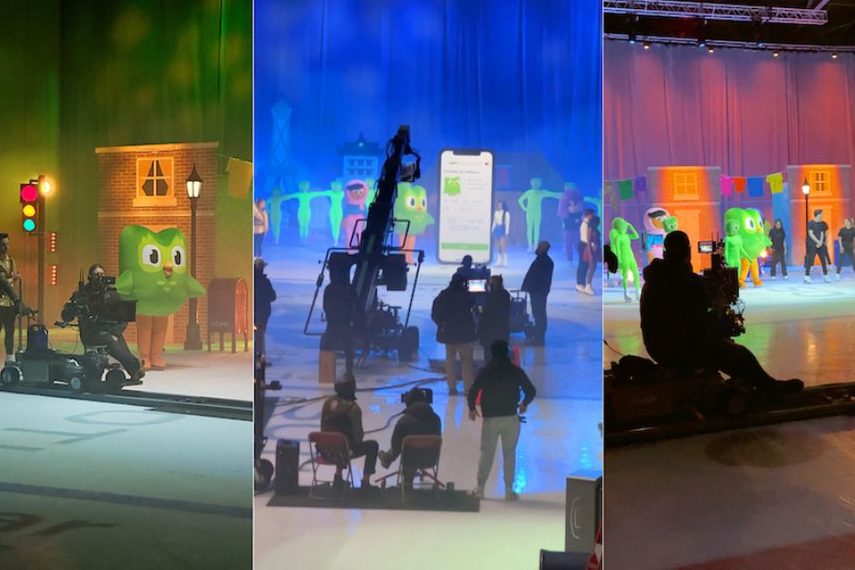
Campaign: Duolingo On Ice
Companies: Duolingo
Agency partners: Caviar and Radke Films (trailer and music video shoot); Loom Post (editing); and Edelman (earned media)
Duration: March 29 — April 5, 2024
On April 1, fans of Disney on Ice briefly had a different ice show to get excited about: Duolingo on Ice, “the world’s first multilingual musical.”
Then they discovered it was an April Fools’ joke. But judging by the reaction of some fans in the humorous Duolingo on Ice advertisement, they were not missing much.
Strategy
Duolingo, a technology company that helps people learn other languages, started doing April Fools’ Day campaigns in 2016. Last year, the company introduced “Love Language,” a reality show from Duolingo and Peacock in which “the hottest singles in the world will share a house in paradise in hopes of finding true love. The catch? None of them speak the same language.”
April Fools’ Day “provides an opportunity to engage our audiences in an even more entertaining way than our day-to-day social media content,” said Michaela Kron, Duolingo director of marketing campaigns. “By creating an idea that gets people talking we're able to reach new audiences.”
The brand creatives decided to do a parody of Disney on Ice because people around the world know it, and “we honestly loved the idea of making something that was more musical and dance oriented,” Kron said.
Tactics
The company launched the campaign March 29 with a teaser video in which Duo, the company’s green owl mascot, ice skates—or rather, tries to skate—at Rockefeller Center as the song “Now or Never” from High School Musical 3 plays in the background.
“Join Duo the owl and all of his friends in a 4-hour skating extravaganza,” a narrator in an advertisement for the supposed show says.
The show features songs like “Spanish or Vanish” and “Le Duo et La Dua.”
As the narrator explains that the show will have no intermission, you see members of the crowd struggling to keep their eyes open and Falstaff, a bear mascot, looking exhausted as he tries to dance.
“Treat your family to the magic, the wonder and the chilling performances of Duolingo on Ice where the tears of the innocent will please the owl for millennia to come.”
A pair of people in green costumes then take a boy off the ice as his mother looks concerned. Afterwards, as other fans talk about how much they enjoyed the show, the mom says, “Where is my son? They took my son!”
Jason Woliner, who directed Borat Subsequent Moviefilm, directed the commercial.
The brand filmed the commercial at an ice rink near Toronto and used professional skaters as the mascots to “make it feel real,” said Kron. “As you're watching though, it’s like, OK, this is a joke, but it's kind of toeing that line in a fun way.”
To further commit to the parody, the brand partnered with the ticket platform SeatGeek to create a website with a list of tour dates and reviews like “Bizarre. Sexy. Unforgettable."
“The SeatGeek partnership was just such an essential component of making this seem like it could be a real thing,” said Kron.
Results
The campaign videos received more than 27 million views and more than 3.5 million likes on TikTok; more than 17 million views and more than 1.3 million likes on Instagram; and more than 1.6 million views and almost 5,000 comments on YouTube.
The campaign also received coverage from publications like the Washington Post, CNET and Quartz.


.jpg&h=334&w=500&q=100&v=20170226&c=1)
.jpeg&h=334&w=500&q=100&v=20170226&c=1)
.jpg&h=334&w=500&q=100&v=20170226&c=1)

.png&h=334&w=500&q=100&v=20170226&c=1)







.jpg&h=268&w=401&q=100&v=20170226&c=1)
.png&h=268&w=401&q=100&v=20170226&c=1)


.png&h=268&w=401&q=100&v=20170226&c=1)
